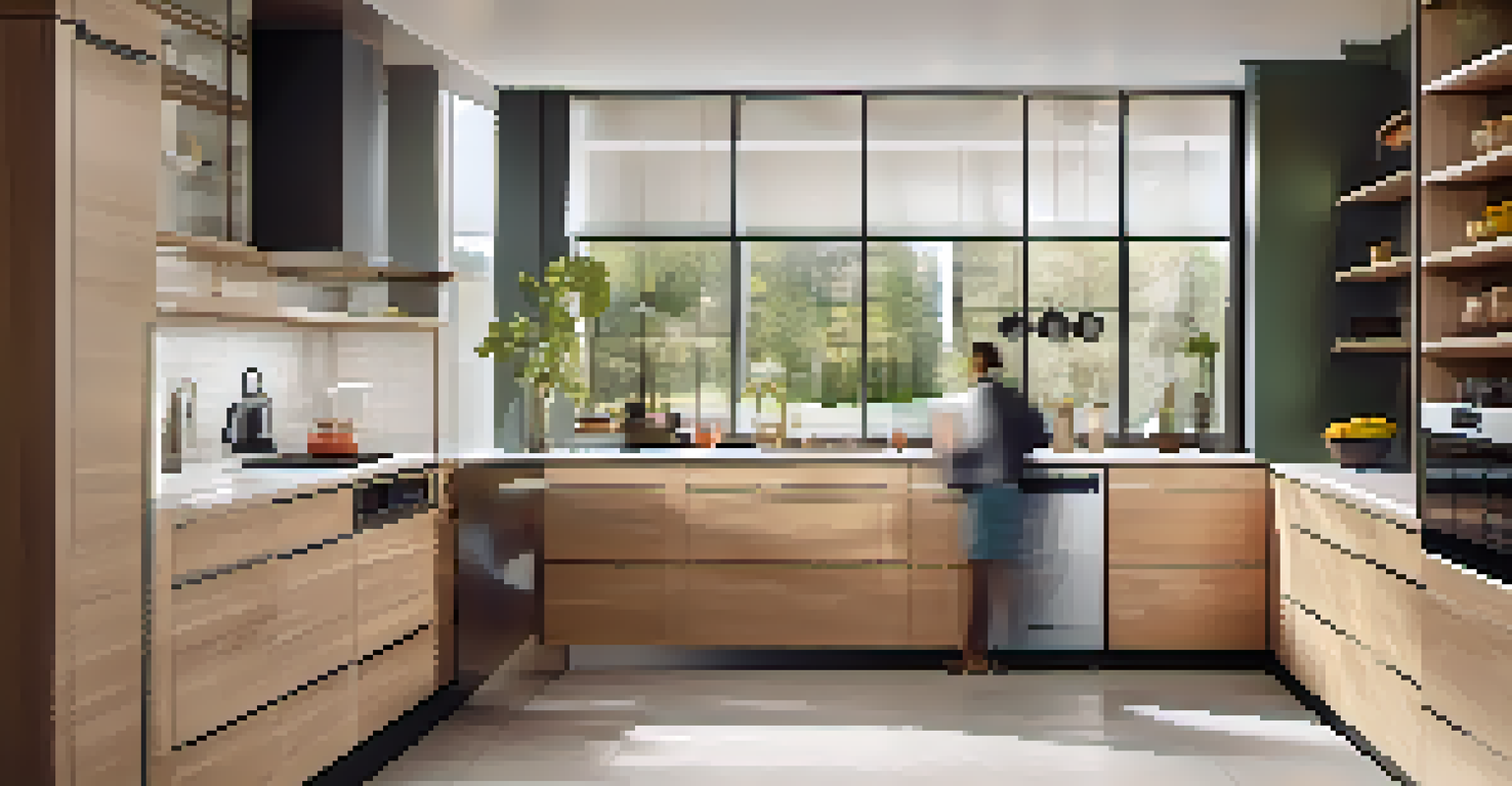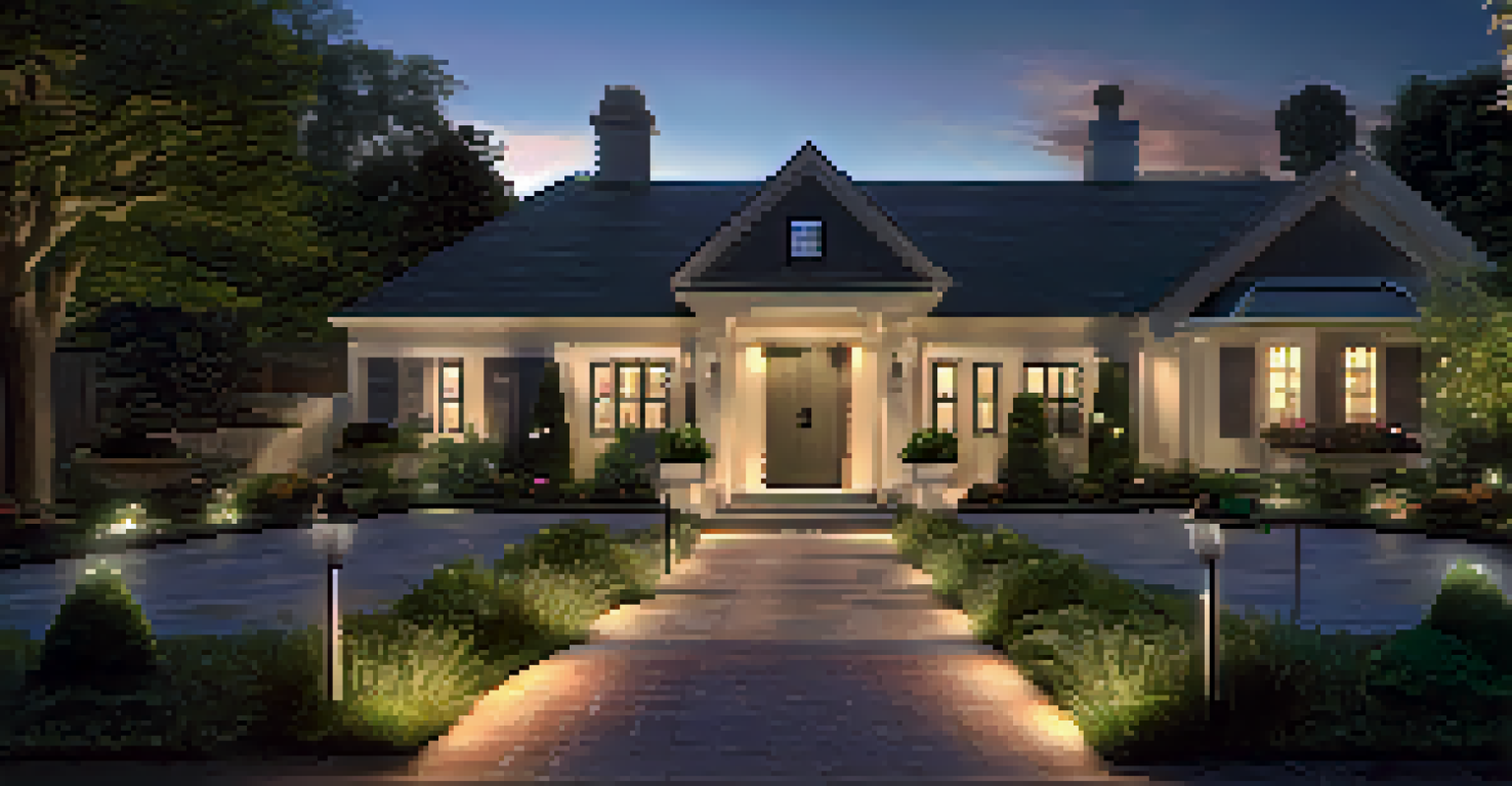How Smart Sensors Improve Home Automation Efficiency

Understanding Smart Sensors and Their Role
Smart sensors are devices that collect data from their environment and respond accordingly. They can monitor everything from temperature and humidity to movement and light levels. By integrating these sensors into home automation systems, homeowners can create a more responsive living space that adapts to their needs.
The best way to predict the future is to create it.
Imagine waking up to a home that knows exactly how to start your day. As you rise, smart sensors can detect your presence, adjust the thermostat to your preferred temperature, and even brew your morning coffee. This level of automation not only enhances comfort but also streamlines daily routines.
The beauty of smart sensors lies in their ability to communicate with other devices. For instance, when a smart sensor detects that it's getting dark outside, it can signal your smart lights to turn on automatically, ensuring your home is always well-lit without requiring any manual effort.
Energy Efficiency Through Smart Sensors
One of the most significant benefits of smart sensors is their ability to enhance energy efficiency. By monitoring energy usage in real-time, these devices can identify patterns and suggest optimizations. For example, if a room is unoccupied, sensors can automatically turn off lights and reduce heating or cooling.

Think of it this way: just like a savvy shopper who knows the best time to buy groceries, smart sensors help you make informed decisions about your energy consumption. They provide insights that can lead to significant savings on utility bills over time.
Smart Sensors Enhance Home Comfort
Smart sensors create responsive living spaces by automating everyday tasks and adjusting settings based on user preferences.
Moreover, when combined with smart home systems, these sensors can learn your habits and adjust settings accordingly. This means your home becomes increasingly efficient as it adapts to your lifestyle, ensuring that energy is only used when necessary.
Enhanced Security with Smart Sensors
Smart sensors play a crucial role in enhancing home security. Motion detectors, door/window sensors, and surveillance cameras can all work together to create a comprehensive safety system. When a sensor detects unexpected movement or an open door, it can send alerts directly to your smartphone.
Technology is best when it brings people together.
Imagine being on vacation and receiving a notification that your front door has been opened. With smart sensors, you can monitor your home from anywhere, ensuring peace of mind while you’re away. This level of responsiveness transforms how we think about home security.
Additionally, smart sensors can integrate with security cameras to provide real-time video feeds. This means that if motion is detected, you can immediately check the live feed to assess the situation, making it easier to respond quickly to potential threats.
Improving Comfort with Smart Temperature Sensors
Temperature sensors are key players in creating a comfortable home environment. They can detect changes in temperature and humidity, allowing your heating and cooling systems to adjust automatically. This means you can enjoy a consistent and comfortable atmosphere without constantly fiddling with the thermostat.
Imagine coming home to a perfectly heated or cooled space, regardless of the weather outside. Smart temperature sensors can learn your preferences over time, ensuring that your home is always at your desired temperature when you arrive.
Boost Energy Efficiency Effortlessly
These devices monitor energy usage in real-time, optimizing consumption and leading to significant savings on utility bills.
Moreover, these sensors can work in tandem with smart blinds or curtains. For instance, if a room gets too hot during the day, the sensors can trigger the blinds to close, reducing heat and maintaining a comfortable indoor climate without any effort on your part.
Streamlining Daily Routines with Smart Sensors
Smart sensors can significantly streamline daily routines by automating mundane tasks. For example, when you enter your home, sensors can trigger your favorite playlist, adjust lighting, and even preheat the oven if you're planning to cook. This level of automation saves time and enhances your overall experience.
Think about how much smoother your evening would be if your home automatically set the mood for relaxation. Smart sensors can help create a seamless transition from day to night, making your routines feel more effortless and enjoyable.
Additionally, smart sensors can send reminders based on your habits. If you often forget to turn off appliances, for instance, the system can alert you when you leave home, helping you avoid unnecessary energy waste and enhancing your peace of mind.
Integrating Smart Sensors with Other Devices
To maximize the benefits of smart sensors, it's essential to integrate them with other smart devices. This creates a cohesive smart home ecosystem where everything works together harmoniously. For instance, smart sensors can communicate with your smart thermostat, lights, and security system to create a personalized experience.
Imagine a scenario where your smart sensors detect that you're leaving for the day. They can automatically turn off lights, adjust the thermostat, and activate the security system, all in one go. This level of coordination not only enhances convenience but also adds an extra layer of security.
Strengthen Home Security Easily
Smart sensors work together to provide comprehensive security, sending alerts and enabling remote monitoring for peace of mind.
Moreover, integrating these sensors allows for greater customization. You can create specific routines and triggers based on your lifestyle, ensuring that your home is not just smart, but also tailored to your unique needs.
Future Trends in Smart Sensor Technology
The future of smart sensor technology looks promising, with advancements that will further enhance home automation efficiency. Innovations like AI and machine learning are being integrated into smart sensors, allowing them to learn and adapt to your behavior more effectively. This means your home could become even more intuitive and responsive.
Imagine a system that anticipates your needs before you even express them. For example, if you usually turn on the coffee maker at a specific time, an advanced smart sensor could automatically start brewing as you wake up, creating a truly seamless experience.

As technology continues to evolve, we can expect to see a greater emphasis on interoperability between devices. This means that smart sensors will not only work within their own ecosystems but also communicate across different platforms, making home automation more efficient and enjoyable than ever.